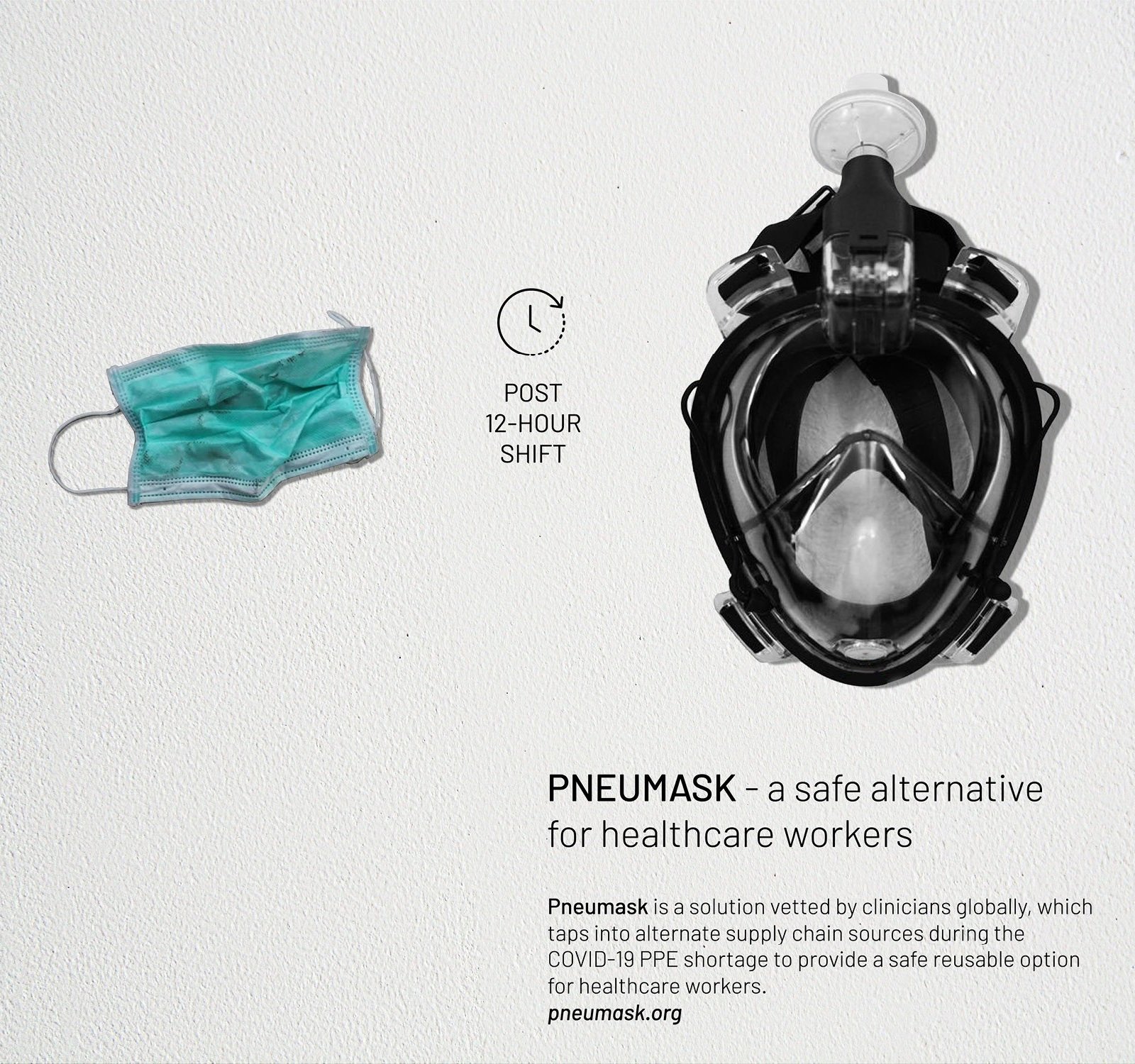Pneumask
ABSTRACT
Here we adapt and evaluate a full-face snorkel mask for use as personal protective equipment (PPE) for health care workers, who lack appropriate alternatives during the COVID-19 crisis in the spring of 2020. The design (referred to as Pneumask) consists of a custom snorkel-specific adapter that couples the snorkel-port of the mask to a rated filter (either a medical-grade ventilator inline filter or an industrial filter). This design has been tested for the sealing capability of the mask, filter performance, CO2 buildup and clinical usability. These tests found the Pneumask capable of forming a seal that exceeds the standards required for half-face respirators or N95 respirators. Filter testing indicates a range of options with varying performance depending on the quality of filter selected, but with typical filter performance exceeding or comparable to the N95 standard. CO2 buildup was found to be roughly equivalent to levels found in half-face elastomeric respirators in literature. Clinical usability tests indicate sufficient visibility and, while speaking is somewhat muffled, this can be addressed via amplification (Bluetooth voice relay to cell phone speakers through an app) in noisy environments. We present guidance on the assembly, usage (donning and doffing) and decontamination protocols. The benefit of the Pneumask as PPE is that it is reusable for longer periods than typical disposable N95 respirators, as the snorkel mask can withstand rigorous decontamination protocols (that are standard to regular elastomeric respirators). With the dire worldwide shortage of PPE for medical personnel, our conclusions on the performance and efficacy of Pneumask as an N95-alternative technology are cautiously optimistic.
During the COVID-19 crisis (Spring 2020), there was a global shortage of personal-protective equipment (PPE) for medical personnel. Bottle necked supply chains for N95 face masks put millions of healthcare workers at risk of being infected with COVID-19 while caring for patients. In order to combat the PPE issues in time, we looked at alternative sources and supply chains that were more abundant and less constricted in the immediate context.
-
https://www.pneumask.org/
-
BIG QUESTION
“Can we rapidly scale and convert a commercial snorkel mask into an N95-grade PPE for hospital personnel in the time of public health emergency?”
Units deployed within U.S.:
3200
units
Units deployed internationally:
23,534
units
Collaboration:
24
countries
What is Pneumask?
Filters are produced for many different applications, with many meeting the N95 standards or better. At the time, filters made for ventilators and woodworking aspirators were more readily available than the traditional N95s and could provide the same level of protection. The challenge was to have these alternate filters fitted or be worn. Another unclogged supply chain resided in recreational snorkeling masks. These were widely available in large quantities and provided a full-face shield and air seal while allowing for controlled intake and exhaust flows through the mask. The missing element between the filter and mask was a custom adaptor - that’s where Pneumask comes in.
Pneumask is a kit of parts consisting of a custom plastic adapter, a recreational full-face snorkel mask, and an FDA or NIOSH-rated filter. The concept is to replace the snorkel piece of the mask with a NIOSH-rated filter via custom adapter to produce an equivalent N95 mask and face shield. This design has been tested for the sealing capability of the mask, filter performance, CO2 buildup and clinical usability. We found the Pneumask is capable of forming a seal that exceeds the standards required for half-face respirators or N95 respirators.
How does it work?
The goal was to design a custom adapter that would allow breathing through the selected filter via the snorkeling mask. The design was open-source and was later adapted for a few other snorkeling mask models/brands by other designers around the world. The custom adapter is injection molded out of a robust medical-grade polypropylene material (but can also be 3D-printed from high-resolution, biocompatible resins for small-volume production). Another version of the adapter piece allows the port to attach to industrial quarter-turn NIOSH P100 filters, for expanded filter supply-chain access in the event that ventilator inline filters are unavailable or unsuitable for use.
Data
To ensure our alternative solution is safe to use in a medical setting, we performed extensive testing to ensure safety and usability. These include the qualitative and quantitative fit testings, filtration efficiency test, pressure drop measurement to evaluate the work of breath, CO2 accumulation test and CFD simulations, exhalation valve leakage test, fluid resistance testing, clinical usability test, and testing on donning, doffing and disinfection protocols. The figure below show the data on the fit testing, which we performed in several separate institutions to ensure that our design can ensure a good seal to the user’s face in air.
a-b) Qualitative fit testing. c) modified adapter to use in conjunction with PortaCount devices for quantitative fit testing d-e) Mask with modified adapter and with internal measurement tube routed down through exhale channel. f) Pneumask and PortaCount device basic terminology g) Sampling tube positions can be at the adapter, in the mouth chamber or in the eye chamber. Most conservative tests are done with the sampling tube in the mouth chamber
Project Status
3200 units were deployed within the U.S. and over 23,500 units were deployed internationally. Pneumask obtained FDA-EUA approval from France (and several European countries). With the decrease in COVID-19 cases, this project is currently inactive.
Collaboration
With the help of hundreds of clinicians (from 24 different countries), the team was able to validate the use of Pneumask, demonstrating the filtration capacity and the breathability of such a system. For this effort, we partnered with several manufacturing partners including BIC, Boston Scientific, Medtronic, Pall Corp, and AM Systems as well as philanthropic funder MITRE to deliver over 25,000 units across France, Belgium, Chile and U.S.
Funding
Project was partially supported by BIC (manufacturing + deployment), Boston Scientific (manufacturing + deployment), Decathlon (material), Medtronic (material), MITRE (deployment)








